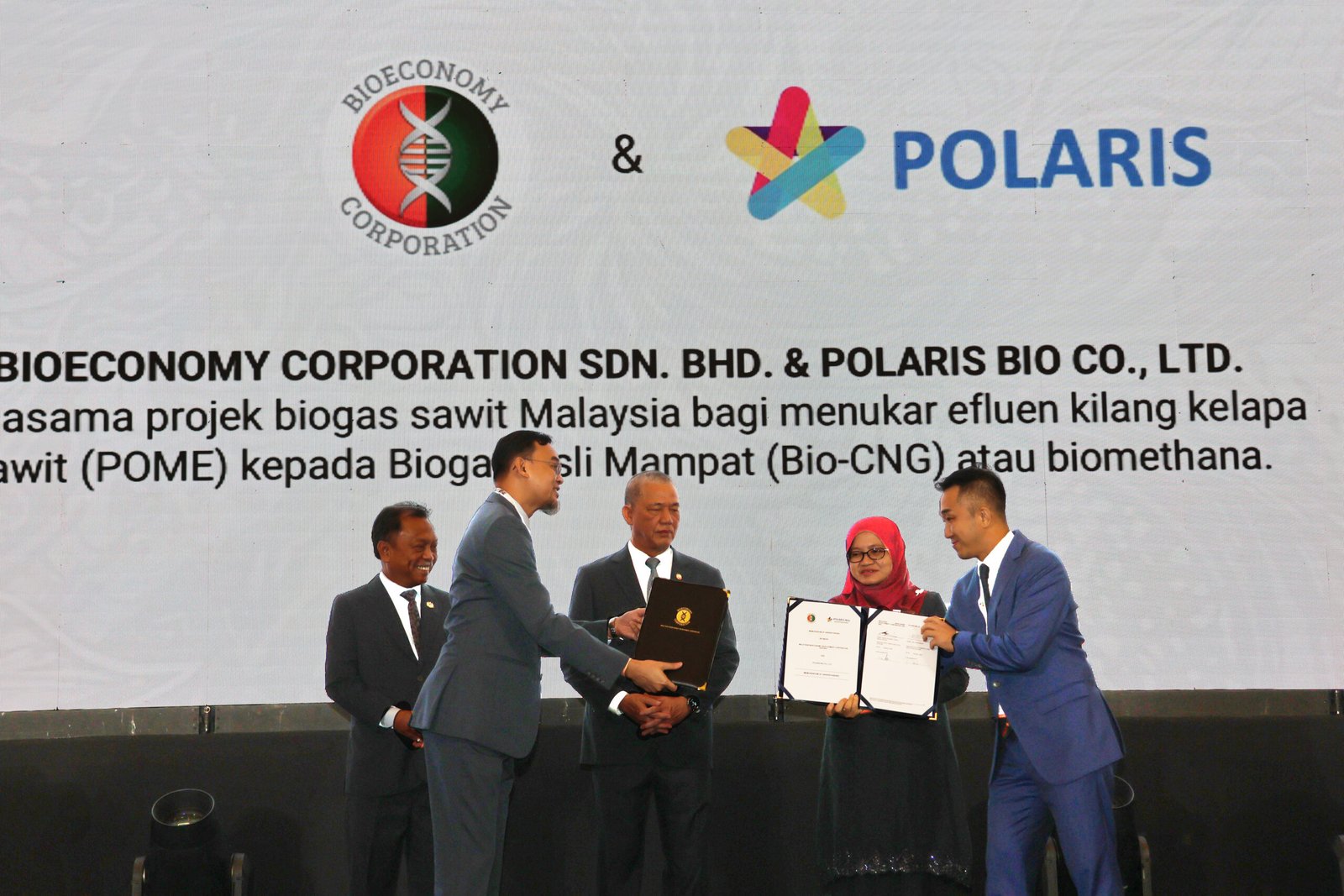Monday, 6 October 2025

Malaysia-South Korea to expand biogas innovation and accelerate decarbonisation with plans for nationwide initiatives
Malaysian Bioeconomy Development Corporation (Bioeconomy Corporation), under the purview of the Ministry of Science, Technology and Innovation Malaysia, has entered into a collaboration with South Korea-based renewable energy company Polaris Bio Co., Ltd. (Polaris Bio) to develop palm oil mill effluent (POME)-based biogas upgrading facilities in Malaysia as part of renewable energy investments.
An initial RM30 million will be invested in the first facility as part of the RM 700 million total planned investments. This pilot project will validate the technical and financial feasibility of biogas upgrading and pave the way for the nationwide rollout of more than 20 facilities, which are expected to cut up to 384,000 tonnes of CO₂ equivalent each year.
The partnership will accelerate the commercialisation of biotechnology converting palm oil mill effluent (POME) into Bio-Compressed Natural Gas (Bio-CNG), a sustainable fuel, while also creating internationally tradable carbon credits – known as Internationally Transferred Mitigation Outcomes (ITMOs) under Article 6.2 of the Paris Agreement.
According to Bioeconomy Corporation’s Chief Executive Officer, En. Mohd Khairul Fidzal Abdul Razak, biogas development from oil palm biomass and waste in Malaysia has long been recognised as a strategic opportunity. While early projects faced inconsistent yields, high maintenance costs, and limited downstream integration, recent technological advances have improved efficiency and reliability, enabling biogas to be upgraded into Bio-CNG, biomethane, and green chemicals – making it a viable pathway for decarbonisation and integration into Malaysia’s renewable energy and bio-based industrial ecosystem.
“Over the past two years, Bioeconomy Corporation has witnessed a series of bioenergy partnerships from its BioNexus Status and Bio-based Accelerator (BBA) companies, signaling a surge of activity in the sector and renewed investor confidence. This is reflected in our partnership with Polaris Bio, which will advance the government’s push to position bioenergy at the heart of Malaysia’s energy transition and power the country’s circular bioeconomy,” he added.
Polaris Bio’s Chief Executive Officer, Junghwan Kim, said the collaboration with Bioeconomy Corporation opens new opportunities for scaling bioenergy solutions in Malaysia, while setting a benchmark for cross-border climate partnerships.
“Since 2020, Polaris Bio has been actively engaged in Malaysia’s pioneering POME-to-Bio-CNG initiatives. Building on this proven track record, we are now delighted to embark on direct investments in partnership with the Government of Korea, including the Ministry of Climate, Energy and Environment, its agency the Sudokwon Landfill Site Management Corporation, and leading Korean private enterprises. This collaboration not only reinforces Korea–Malaysia cooperation in renewable energy and carbon markets, but also stands as the first bilateral endeavour under Article 6.2, enhancing carbon market development in both nations,” he stated.
Deputy Prime Minister and Minister of Energy Transition and Water Transformation, YAB Dato’ Sri Haji Fadillah Yusof witnessed the exchange of memorandum of understanding between En. Mohd Khairul Fidzal Abdul Razak and Junghwan Kim at the opening ceremony of the National Innovation and Creative Economy Expo 2025 (NICE 2025) in Kuala Lumpur today.
The partnership represents a timely step in aligning national priorities with international investment to reinforce Malaysia’s low-carbon transition under the National Energy Transition Roadmap (NETR) and its target of 40 per cent renewables in the primary energy mix by 2035, while supporting the goals of the National Biotechnology Policy 2.0 to drive sustainable bio-based industries and innovation for the nation’s circular economy.